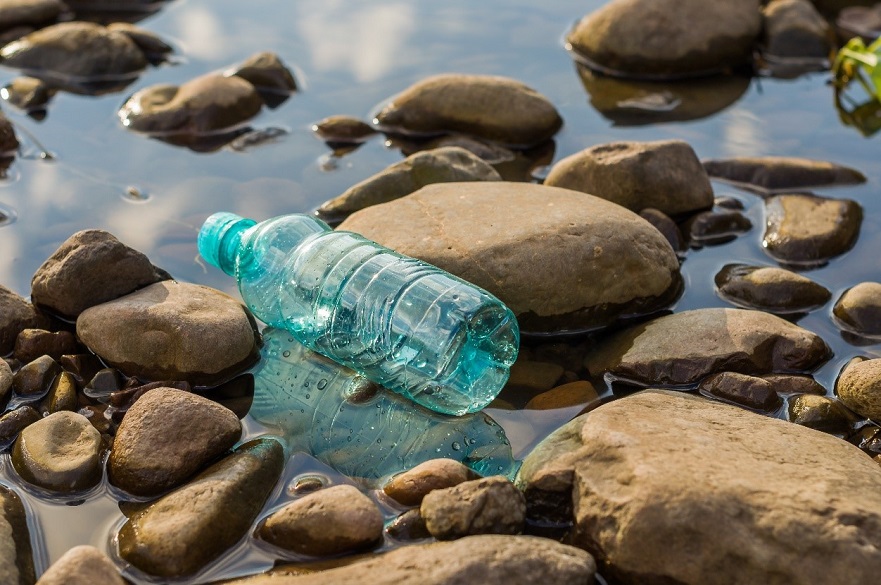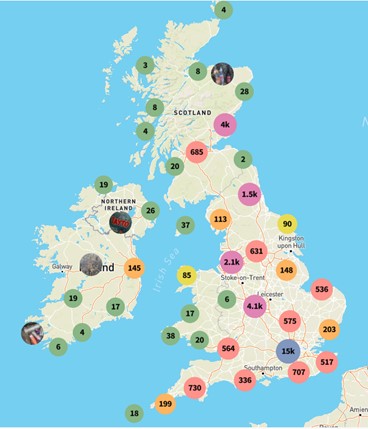New study finds UK litter is dominated by plastics and drinks packaging
A new study looking at litter in the UK has revealed the types of materials and products that are being dumped in our hedgerows and waterways.
By Dave Rogers | Published on 25 May 2022
Categories: Press office; Research; School of Animal, Rural and Environmental Sciences;

The research, led by Loughborough University geographer Dr Tom Stanton and involving Nottingham Trent University's School of Animal, Rural and Environmental Sciences, found the majority of UK litter is made up of plastic, and the most common items discarded into the environment are drinks packaging.
Dr Stanton says the findings are ‘surprising’ given the European-wide initiatives in place that look to reduce single-use plastic and highlight ‘the disconnect’ between the findings and the focus of environmental legislation and policy.
Published in the Journal of Hazardous Materials, the study is in collaboration with Planet Patrol - the environmental non-profit dedicated to tackling the pressing threats of pollution using its citizen science app to analyse and interpret data to drive change.
Each year, Planet Patrol launches clean up events across the UK for public participation. At these events or independently, volunteers add data to the app by tracking, logging, and removing litter from around land, coastlines, and waterways. Each piece is recorded and geolocated in the app - broken down by brand, material, and type, with each individual piece verified and photographed.
Working with colleagues from NTU and Keele universities plus the University of Nottingham, Dr Stanton examined 43,187 items of litter found across the UK that were logged on the Planet Patrol app throughout 2020.
The researchers found:
- 63% of items were made of plastic, 14% metal, and 12% composite (a material made from two or more different materials)
- The majority of all litter (56%) had been used as packaging, with beverage containers accounting for 33.4% of all litter
- Though most items of litter were plastic-based, when it came to litter associated with the beverage industry, metal cans were highest in abundance (33.6%) and then plastic bottles (29.7%)
- Branding could be identified on 38.8% of all the logged litter - 26% of the brand-bearing litter was associated with the Coca-Cola Company, Anheuser-Busch InBev, and PepsiCo.

This study looked at 43,187 items of litter logged on the Planet Patrol app; the map shows the number of logs for different locations across the UK
Dr Stanton explained: “There are many stakeholders responsible for the litter that ends up in the environment. Governments have introduced legislation that can reduce some types of litter, and companies have policies that aim to reduce the environmental impacts of their practices.
“This study looked at how these efforts to curb litter by key stakeholders compared to the types of litter recorded by Planet Patrol’s citizen scientists.”
He continued: “This study concludes that corporate policies focus more on the materials of the products they put to market, than their products’ environmental fates.
“The current decade has the potential to be a decade of change with respect to both the amounts and types of litter found in the environment.
“We hope this study raises awareness of the extent and diversity of litter across the UK, and in particular the profile of litter that is often marketed as a greener alternative to plastic but is still a problem in the environment.”
Dr Stanton added: “The impact of legislation and policy in this area will need to be monitored if the success of green initiatives is to be effectively judged, however, the data against which future comparisons can be made is limited.
“We hope that this dataset can provide a reference for future work that attempts to assess the success of the legislation and policy that is set to change throughout the current decade.”
The researchers hope to build on this research by exploring differences in the types of litter that are found by app users in different countries.
They will also monitor the UK dataset over the next few years and assess how profiles of litter change over time, and the impact of legislation and policy changes.
The full paper, titled ‘Planet Patrolling: A citizen science brand audit of anthropogenic litter in the context of national legislation and international policy’, can accessed via the Journal of Hazardous Materials website
Notes for Editors
Press enquiries please contact Dave Rogers, Public Relations Manager, on telephone +44 (0)115 848 8782, or via email.
About Planet Patrol
Since 2016, more than 35,000 Planet Patrol volunteers have logged over 400,000 pieces of litter across 113 countries worldwide redefining what can be achieved through collective action and people-powered data. Website: https://planetpatrol.co/
Nottingham Trent University (NTU) received the Queens Anniversary Prize for Higher and Further Education in 2021 for cultural heritage science research. It is the second time that NTU has been bestowed the honour of receiving a Queen’s Anniversary Prize for its research, the first being in 2015 for leading-edge research on the safety and security of global citizens.
The Research Excellence Framework (2021) classed 83% of NTU’s research activity as either world-leading or internationally excellent. 86% of NTU’s research impact was assessed to be either world-leading or internationally excellent.
NTU was awarded Outstanding Support for Students 2020 (Times Higher Education Awards). It was the University of the Year 2019 (Guardian University Awards, UK Social Mobility Awards), Modern University of the Year 2018 (Times and Sunday Times Good University Guide) and University of the Year 2017 (Times Higher Education Awards).
NTU is the 5th largest UK institution by student numbers, with over 33,000 students and more than 4,000 staff located across five campuses. It has an international student population of 4,000 and an NTU community representing around 160 countries.
In the past 15 years, NTU has invested £450 million in tools, technology and facilities.
NTU is in the UK’s top 10 for number of applications and ranked first for accepted offers (2019 UCAS UG acceptance data) It is also among the UK’s top five recruiters of students from disadvantaged backgrounds.
75% of NTU students go on to graduate-level employment or graduate-entry education / training within fifteen months of graduating (Guardian University Guide 2021).
NTU is 4th globally (and 3rd in the UK) for sustainability in the 2021 UI Green Metric University World Rankings (out of more than 900 participating universities).